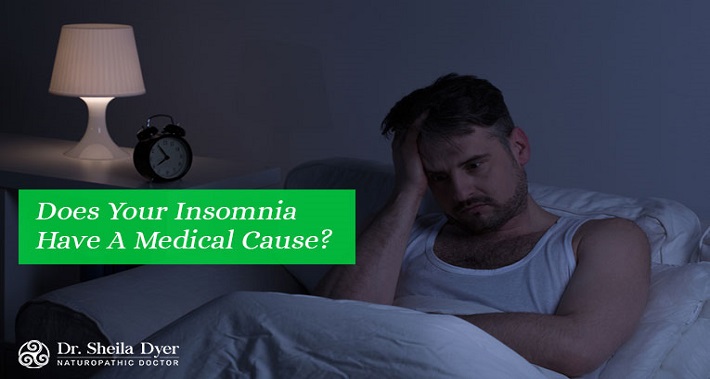Anyone who’s suffered from short term insomnia understands how important sleep is.
Most adults have, at some point or another, experienced a few days or perhaps a couple of weeks of insomnia.
We all need varying amounts of sleep, but on average, 7 to 8 hours is what we should be getting every night.
If you’ve experienced a prolonged bout of sleeplessness, you may need help from a chronic fatigue naturopathic doctor to help get you feeling energetic once more.
Read on to learn what could be causing your insomnia.
What Is Insomnia?
Insomnia is considered a sleep disorder, and can be acute (short term) or chronic (long term).
Chronic insomnia is characterized as insomnia that has lasted for a month or more.
Insomnia makes it hard for you to fall asleep, stay asleep, or it may mean you wake too early, before you’re properly rested.
The result of too little sleep causes you to be sleep deprived.
You might feel tired, lethargic, moody, unfocused, or have other unpleasant effects on your quality of life.
When seeing a healthcare provider about it, it’s important to consider the root cause, not just treat the insomnia alone.
Insomnia might be the only symptom that’s bothering you, but it can also indicate an underlying medical condition like a hormonal imbalance, or be a result of medications you’re taking.
Your naturopathic doctor may send you for a sleep study to help determine that.
Symptoms Of Insomnia
A good guideline for managing insomnia is that if it is causing you difficulty getting through your day, it’s time to get help.
If this is your experience, it’s time to contact me, Dr. Sheila.
Together, we can get your insomnia back on track.
Here are some of the symptoms that come with insomnia, though you might also experience others.
- Difficulty falling asleep at night
- Waking up during the night
- Waking up too early
- Frequent worrying about sleep
- Not feeling well rested when you wake up
- Difficulty remembering
- Difficulty focusing on tasks
- Tiredness and sleepiness during daylight hours
- Depression, anxiety, irritability
- Decreased ability to manage stress
- More frequent errors and accidents
Medical Causes Of Insomnia
Here’s where you might need help: determining if your insomnia has a medical cause, and what can be done about it.
There are many causes of insomnia.
Some might be medical, but others might not be.
However, figuring out the cause of your insomnia can help you get back to sleeping well.
In this section, we’ll take a look at the medical causes of insomnia.
The good news is that there are both natural and medical interventions that can be explored, depending on the symptoms and severity of your condition.
1. Stress And Anxiety
Life is stressful, which is why it’s important to have good coping techniques and a support system.
Despite our best efforts, life occurrences can still cause acute or chronic insomnia.
Experiences like job loss, financial struggles, divorce, school, the illness or death of a loved one, and more can contribute to the development of insomnia.
Mental health conditions can also contribute to insomnia, including:
- Depression
- Anxiety
- Post traumatic stress disorder
- Bipolar disorder
- Obsessive compulsive disorder
- Frequent panic attacks
In fact, people dealing with mental illness are far more likely to have sleep disorders than someone without.
Be sure to see your naturopathic doctor and to mention your sleep issues as well.
Insomnia can be a key indicator for the type of condition that’s affecting you.
2. Sleep Apnea
Sleep apnea is a potentially serious condition where you stop breathing occasionally during the night.
It causes frequent disturbances in your sleep, even if you aren’t aware of it.
Sometimes it requires a sleep study to determine if you have sleep apnea or not.
Sleep apnea might be caused by allergies, asthma or weight issues.
However, a key symptom is heavy snoring.
If your partner is constantly complaining about your snoring, it might be a sign of sleep apnea.
This is especially true if their complaints occur when you wake up feeling groggy and tired.
3. Chronic Pain
Pain doesn’t go away just because you’re going to bed.
When you have chronic pain, you’re dealing with it all night.
If it flares, it can even interrupt your sleep.
The source of your chronic pain doesn’t matter.
Whether it’s from an accident, fibromyalgia, rheumatoid arthritis, cancer, chronic back issues or anything else, sleep is of the utmost importance.
If you’re experiencing pain, it’s important to sleep well, as this allows the body to heal.
When we can’t get a good night’s rest in, it can actually cause a negative feedback cycle.
This causes the pain to increase, making sleep an even bigger challenge.
4. Parkinson’s Disease
Parkinson’s is a challenging disease on its own, never mind that it also challenges the body’s sleep cycle on several different fronts.
Parkinson’s affects the brain and nerve signaling, which can cause sleep apnea and also an over sensitive urination trigger.
The medications you take to fight Parkinson’s can also cause insomnia.
However, medications that assist in sleep can cause increased confusion for patients, making them a poor fit.
Parkinson’s disease seems to disrupt REM sleep, as well.
People with Parkinson’s can suffer from anxiety and depression, which in themselves can also lead to sleep issues.
5. Hyperthyroidism
Hyperthyroidism, often caused by Graves’ disease, is an overproduction of the hormone thyroxine by your thyroid gland.
When this happens, it accelerates your metabolism and can cause an irregular or rapid heartbeat.
This can interrupt sleep, causing you to wake up frequently and therefore feel poorly rested in the morning.
RELATED: How Stress Can Interfere With Your Thyroid Health
6. Menopause
During menopause, and even perimenopause, your estrogen and progesterone levels change.
This drop off is caused by your body moving out of childbearing years.
It comes with a whole host of resulting symptoms.
Some of these symptoms can make sleep difficult, such as having hot flashes throughout the night that wake you up multiple times.
7. Certain Prescription Medications
Prescription medications are incredibly helpful when it comes to treating a condition or illness you may experience.
However, they can come with their own challenges in the form of side effects.
We’ve all heard the ads where the list of possible side effects is longer than the ad for what the drug CAN do.
As it turns out, sleep disruption is one of the more common side effects.
Some of the more common drugs that cause sleep disturbance include:
- SSRIs such as Prozac, and other antidepressants
- Medication for treating ADHD like Ritalin
- Certain allergy and cold medications
- Asthma medications
- Blood pressure medications
- Over the counter decongestants containing pseudoephedrine
- Some OTC pain medications
- Weight loss products commonly available in drug stores
Book Your Appointment With Dr. Sheila Dyer, ND, Today
If you’ve been dealing with insomnia, you don’t have to cope alone.
No matter what the cause, there are ways of uncovering what that cause is, and creating a treatment plan that takes everything into account.
Sleep is so important to your quality of life.
Call now to book your appointment with me, Dr. Sheila Dyer, ND, and we’ll work to get you sleeping like a baby again in no time.
Book your appointment with me, Dr. Sheila Dyer, ND, today.
If you have questions about naturopathic medicine, or would like to start with your first consultation, contact me, and let’s book an appointment.
Dr. Sheila Dyer, ND1080 Dovercourt Rd,
Toronto, ON M6H 2X8
(416) 554-5135
► https://g.page/DrSheilaDyerNd
Dr. Sheila Dyer is a Naturopathic Doctor and a practicing registered nurse offering holistic healthcare with a scientific focus

